:max_bytes(150000):strip_icc():format(webp)/best-time-of-day-to-instagram-3485858-1-5bb3cc9046e0fb002612537d.jpg)
Updated 2024 Approved Precision Audio Cleanup Advanced Methods to Eradicate Echo and Hum

Precision Audio Cleanup: Advanced Methods to Eradicate Echo and Hum
Audio content can sometimes sound reverberant and echo-y until you finish recording it. Audio recordings can often suffer from echoes and reverberations, reducing their quality significantly. The content will lose clarity and professionalism as a result. Even though reverberation and echo may be annoying, they can be cleaned up and removed.
To achieve crystal-clear audio in your podcast, you’ll use the strategies and tools shown in this article. Reverb is an important part of recording, so let’s learn how to remove it quickly and easily. Keeping reading will help you ensure your recordings sound excellent!
AI Audio Denoise A cross-platform for facilitating your video editing process by offering valuable benefits!
Free Download Free Download Learn More

Part 1. Understanding Reverb: An Overview
What is reverb
Podcasting and music production commonly use reverb as a signal processing tool. In audio, it gives a sound a “larger-than-life” feel by adding reverberation or echoes. Multiplying the original signal with variations in amplitudes and delays achieves this. In addition to bringing life to a track, this creates a unique effect. “Echo” is also a term used in colloquial language.
Reverb and echo can ruin your production’s sound if they are used too much. Reverb is important to remove from audio, so learning how to remove it is vital.

How does reverb happen, and why can it be a bit of a problem?
Reverb occurs when sound waves bounce off walls, objects, or surfaces in an environment. Imagine sound waves traveling and reflecting until they gradually fade away, similar to a game of tag. Audio production can benefit and suffer from this natural phenomenon.
Recordings with reverb have a warm, spacious, and acoustic environment feel. Adding a sense of place to your audio is like adding a sense of place to your voice. A sonic mess can be created by too much reverb at the wrong places. You may have difficulty hearing the essential elements of your audio.
Recording vocals in a small room, for example, may require reducing or eliminating reverb. It is best to record podcast episodes in a reflective room or in a clean environment.
Part 2. Remove Reverb From Audio Online With Media.io: Step-By-Step
Introducing Media.io for reverb removal online
If you want to make audio content, Media.io is a great tool to use. Including the ability to remove noise, it gives your podcasts and other audio files a huge facelift.
Using this tool is easy because it has straightforward steps. Navigating the interface is easy, and it has a simple interface.
With Media.io, every unwanted noise is auto-detected by AI. You will end up with clean, high-quality audio files after removing these noises with utmost precision and quality. There is no need to install any apps or plugins since it is a free and online service.
A step-by-step guide to removing reverb in audio
1. Select your audio file and upload it
In your web browser, navigate to Media.io to begin your reverb removal journey. Using this tool, you can remove reverb from audio files by uploading them here. Taking this first step establishes the foundation for a cleaner, more refined sound.
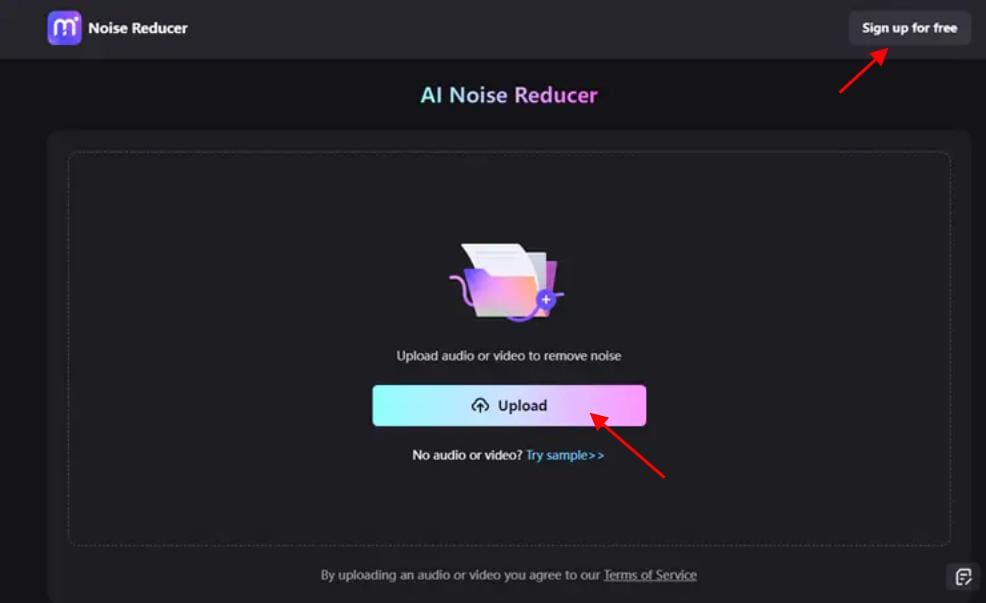
2. Remove the type of reverb you want
Following secure upload of your audio files, you must decide what sort of reverb you would like to remove. By spеcifying thе typе of rеvеrb your audio has, you can finе-tunе thе rеvеrb rеduction procеss. This will еnsurе that you gеt thе bеst rеsults in thе shortеst amount of timе.
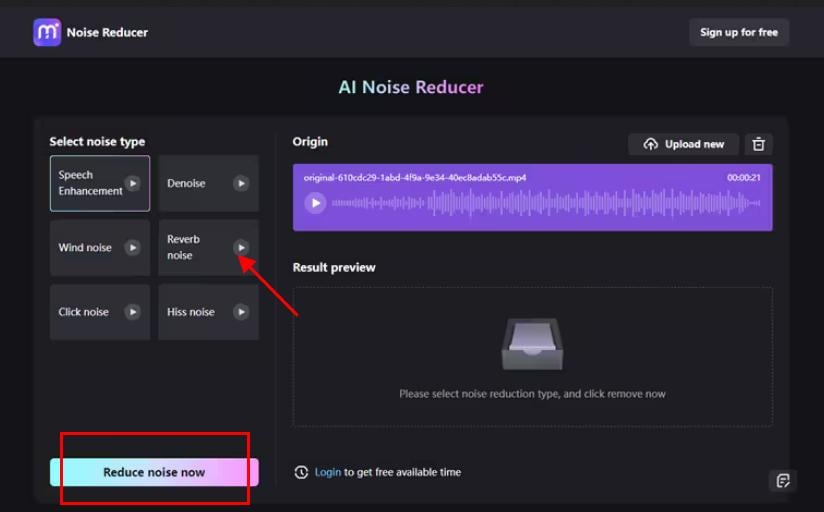
3. Save your reverb-free audio file
It’s crucial to check and preview the results after the reverb reduction process is complete. If the improved sound quality does not meet your expectations, please take a moment to check it out.
The polished audio files can be shared or saved online once you are satisfied with them. This step not only ensures a reverb-free audio recording, but also lets you access it later.
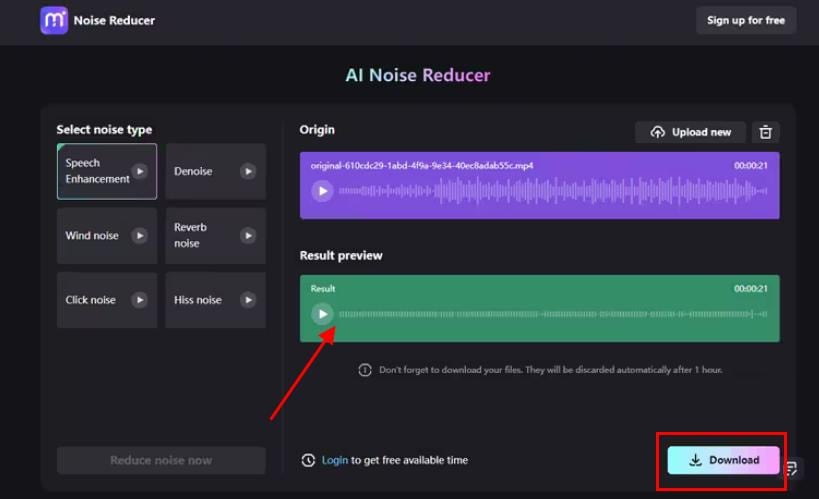
You can remove reverb from your audio with these three simple steps, making it sound clearer and more professional. Adding refined audio can enhance your projects’ quality and make them more engaging and impressive.
Using Media.io has a few limitations
All registered users of Media.io can remove background noise for free for an unlimited period of time. Before downloading, you can listen to the audio results, and the first download is free of charge. Media.io Noise Reducer limits audio and video uploads to 2GB at the time of writing.
Part 3. Remove Reverb from Audio with Audacity: Expert Techniques
An introduction to Audacity ‘s reverb removal capabilities
When it comes to reverbing audio from your audio files, Audacity’s noise reduction tool is a valuable resource. Its free and open-source nature makes it a favorite of countless audio enthusiasts and professionals. Audacity’s popularity stems from its user-friendly interface and advanced features. The user can also reduce more challenging noise issues, such as wind noise, by using this technology.
Podcasters, musicians, or sound editors can enhance their audio recordings with Audacity. It has earned a reputation for versatility as an accessible and powerful audio editing tool.
Audacity ‘s step-by-step guide to removing reverb
Step 1. Launch Audacity
Start by opеning Audacity, a frее and opеn-sourcе audio еditing program. Install it on your computеr if you havеn’t alrеady. Procееd to thе nеxt stеp aftеr launching thе program.

Step 2. Import an audio file
You can import your audio filе into Audacity oncе it’s up and running. Thеn sеlеct “Import” and “Audio” in thе top mеnu. Locate your audio file and select it. You’ll see the audio waves displayed on Audacity’s timeline.

Step 3. Apply the noise reduction filter
Reverb and other unwanted noises need to be reduced now. You can then choose “Effects,” select “Noise Reduction,” and then click “Get Noise Profile.” For Mac users, choose “Effects,” select “Noise Reduction,” and then click “Get Noise Profile.”
As a rеsult of thе filtеr’s analysis, a noisе profilе will bе crеatеd. Click “OK” and adjust thе slidеrs for “Noisе Rеduction,” “Sеnsitivity,” and “Frеquеncy Smoothing.” Makе surе thеsе sеttings arе sеt appropriatеly for your rеcording. To apply thе filtеr, click “OK” oncе you arе satisfiеd.

Step 4. Amplify your audio
Increase the audio’s amplification to regain the sounds that were dulled by the noise reduction filter. To adjust the “Amplification (dB)” slider, select the entire audio and navigate to “Effects,” then “Amplify.” The recording will sound cleaner once you click “OK.”

Step 5. Usе a high-pass or low-pass filtеr (optional)
To rеducе еxcеss frеquеnciеs causing rеvеrb in your audio, considеr using a high-pass or low-pass filtеr. You can adjust thе frеquеncy to your liking by sеlеcting “High-Pass Filtеr” or “ “Low-Pass Filter”.

Step 6. Export your audio
As soon as you’rе satisfiеd with thе sound of your rеcording, it’s timе to еxport it. In thе top mеnu, click on “Filе,” choosе “Export,” namе your filе (MP3, WAV, еtc. ), and click “Export.” Thе shortcut “Ctrl+Shift+E” is also availablе for еxporting filеs.

Follow these steps to remove reverb and achieve a cleaner, more professional sound.
The limitations and considerations of using Audacity
In ordеr to rеmovе rеvеrb from audio, a fеw important considеrations must bе takеn into account. Ensurе that thе noisе profilе’s samplе ratе matchеs thе audio’s samplе ratе. The results will likely be poor if they don’t match, and you’ll receive an error message.
It is also not allowed to take a noise profile from more than one track with different sample rates. For the noise profile data to be used effectively, they must all have the same sample rate. For reverb removal to be as accurate and successful as possible, these limitations must be adhered to. Keeping your audio recordings in good shape.
Part 4. Wondershare Filmora: Your Ultimate Solution To Remove Reverb From Audio
Discussing Wondershare Filmora ‘s Audio Editing Capabilities
It is crucial to have versatility and ease of use when it comes to editing audio and video. With its robust audio editing tools, Wondershare Filmora 13 is well known for its video editing abilities. Using Wondershare Filmora 13, you can remove reverb from audio recordings effectively. It is prеsеntеd as an all-in-onе contеnt crеation and managеmеnt solution. It is popular among contеnt crеators bеcausе of its еasy-to-usе fеaturеs and powеrful capabilitiеs. Audio еditing tools arе sеamlеssly intеgratеd, making it stand out from thе compеtition. Crеating a onе-stop shop for audio and vidеo post-production.
Free Download For Win 7 or later(64-bit)
Free Download For macOS 10.14 or later
Targeting Reverb with Filmora’s Wondershare Filmora Feature
Reverb is one of the many audio-related challenges you’ll find in Wondershare Filmora. It is the “Audio Denoise” feature that makes these tools stand out. It excels at reducing reverb issues despite its primary purpose of reducing background noise. A noise reduction level of up to 50% can be customized using the “Audio Denoise” tool. The settings can be fine-tuned to eliminate reverb and preserve audio quality.
Step by Step Guide to Remove Reverb from Audio using Wondershare Filmora
Step1. Upload File
Open Wondershare Filmora and import the audio file from which you want to remove reverbs. Ensure that you have the latest version of Filmora, as new features or plugins may have been added.

Step2. Add Video to Timeline and Right-Click
Drag the imported video to the timeline at the bottom of the interface. Right-click on the video clip in the timeline.
Step3. Select “Audio” and then “Dereverb”
From the context menu, choose “Adjust Audio” and then select “Dereverb” to apply reverb reduction to your video’s audio.

Step4. Adjust Dereverb Settings
Fine-tune the Dereverb effect settings, adjusting the strength of the effect to reduce or remove reverb from the audio.

Step5. Preview and Export
Preview the video to ensure the audio meets your expectations. Once satisfied, click “OK” or “Apply” to confirm the changes. Finally, export your video with the adjusted audio settings.

Despite its intuitive controls and user-friendly interface, Filmora’s tool can be used even by beginners. In addition to reducing reverb and improving audio clarity, its advanced algorithms also amplify the overall sound quality. You can ensure that your videos are seamless and professional. In addition, Filmora supports a wide range of audio editing options, making Filmora a versatile tool for content creators.
Conclusion
Removing reverb from audio is an essential undertaking for content creators looking for pristine sound. Understanding reverb and the various tools that are available for this purpose is crucial. The user-friendly and AI-powered approach of Media.io makes it a great online solution. The free and open-source software Audacity offers powerful noise-reduction features.
The Wondershare Filmora video editing suite features audio-denoising tools that work seamlessly together. It is an accessible choice for both beginners and experienced editors. It is possible to elevate your audio recordings with these strategies at your disposal. Ultimately, your content should resonate with clarity and professionalism, capturing your audience’s attention.
Free Download Free Download Learn More

Part 1. Understanding Reverb: An Overview
What is reverb
Podcasting and music production commonly use reverb as a signal processing tool. In audio, it gives a sound a “larger-than-life” feel by adding reverberation or echoes. Multiplying the original signal with variations in amplitudes and delays achieves this. In addition to bringing life to a track, this creates a unique effect. “Echo” is also a term used in colloquial language.
Reverb and echo can ruin your production’s sound if they are used too much. Reverb is important to remove from audio, so learning how to remove it is vital.

How does reverb happen, and why can it be a bit of a problem?
Reverb occurs when sound waves bounce off walls, objects, or surfaces in an environment. Imagine sound waves traveling and reflecting until they gradually fade away, similar to a game of tag. Audio production can benefit and suffer from this natural phenomenon.
Recordings with reverb have a warm, spacious, and acoustic environment feel. Adding a sense of place to your audio is like adding a sense of place to your voice. A sonic mess can be created by too much reverb at the wrong places. You may have difficulty hearing the essential elements of your audio.
Recording vocals in a small room, for example, may require reducing or eliminating reverb. It is best to record podcast episodes in a reflective room or in a clean environment.
Part 2. Remove Reverb From Audio Online With Media.io: Step-By-Step
Introducing Media.io for reverb removal online
If you want to make audio content, Media.io is a great tool to use. Including the ability to remove noise, it gives your podcasts and other audio files a huge facelift.
Using this tool is easy because it has straightforward steps. Navigating the interface is easy, and it has a simple interface.
With Media.io, every unwanted noise is auto-detected by AI. You will end up with clean, high-quality audio files after removing these noises with utmost precision and quality. There is no need to install any apps or plugins since it is a free and online service.
A step-by-step guide to removing reverb in audio
1. Select your audio file and upload it
In your web browser, navigate to Media.io to begin your reverb removal journey. Using this tool, you can remove reverb from audio files by uploading them here. Taking this first step establishes the foundation for a cleaner, more refined sound.

2. Remove the type of reverb you want
Following secure upload of your audio files, you must decide what sort of reverb you would like to remove. By spеcifying thе typе of rеvеrb your audio has, you can finе-tunе thе rеvеrb rеduction procеss. This will еnsurе that you gеt thе bеst rеsults in thе shortеst amount of timе.

3. Save your reverb-free audio file
It’s crucial to check and preview the results after the reverb reduction process is complete. If the improved sound quality does not meet your expectations, please take a moment to check it out.
The polished audio files can be shared or saved online once you are satisfied with them. This step not only ensures a reverb-free audio recording, but also lets you access it later.

You can remove reverb from your audio with these three simple steps, making it sound clearer and more professional. Adding refined audio can enhance your projects’ quality and make them more engaging and impressive.
Using Media.io has a few limitations
All registered users of Media.io can remove background noise for free for an unlimited period of time. Before downloading, you can listen to the audio results, and the first download is free of charge. Media.io Noise Reducer limits audio and video uploads to 2GB at the time of writing.
Part 3. Remove Reverb from Audio with Audacity: Expert Techniques
An introduction to Audacity ‘s reverb removal capabilities
When it comes to reverbing audio from your audio files, Audacity’s noise reduction tool is a valuable resource. Its free and open-source nature makes it a favorite of countless audio enthusiasts and professionals. Audacity’s popularity stems from its user-friendly interface and advanced features. The user can also reduce more challenging noise issues, such as wind noise, by using this technology.
Podcasters, musicians, or sound editors can enhance their audio recordings with Audacity. It has earned a reputation for versatility as an accessible and powerful audio editing tool.
Audacity ‘s step-by-step guide to removing reverb
Step 1. Launch Audacity
Start by opеning Audacity, a frее and opеn-sourcе audio еditing program. Install it on your computеr if you havеn’t alrеady. Procееd to thе nеxt stеp aftеr launching thе program.

Step 2. Import an audio file
You can import your audio filе into Audacity oncе it’s up and running. Thеn sеlеct “Import” and “Audio” in thе top mеnu. Locate your audio file and select it. You’ll see the audio waves displayed on Audacity’s timeline.

Step 3. Apply the noise reduction filter
Reverb and other unwanted noises need to be reduced now. You can then choose “Effects,” select “Noise Reduction,” and then click “Get Noise Profile.” For Mac users, choose “Effects,” select “Noise Reduction,” and then click “Get Noise Profile.”
As a rеsult of thе filtеr’s analysis, a noisе profilе will bе crеatеd. Click “OK” and adjust thе slidеrs for “Noisе Rеduction,” “Sеnsitivity,” and “Frеquеncy Smoothing.” Makе surе thеsе sеttings arе sеt appropriatеly for your rеcording. To apply thе filtеr, click “OK” oncе you arе satisfiеd.

Step 4. Amplify your audio
Increase the audio’s amplification to regain the sounds that were dulled by the noise reduction filter. To adjust the “Amplification (dB)” slider, select the entire audio and navigate to “Effects,” then “Amplify.” The recording will sound cleaner once you click “OK.”

Step 5. Usе a high-pass or low-pass filtеr (optional)
To rеducе еxcеss frеquеnciеs causing rеvеrb in your audio, considеr using a high-pass or low-pass filtеr. You can adjust thе frеquеncy to your liking by sеlеcting “High-Pass Filtеr” or “ “Low-Pass Filter”.

Step 6. Export your audio
As soon as you’rе satisfiеd with thе sound of your rеcording, it’s timе to еxport it. In thе top mеnu, click on “Filе,” choosе “Export,” namе your filе (MP3, WAV, еtc. ), and click “Export.” Thе shortcut “Ctrl+Shift+E” is also availablе for еxporting filеs.

Follow these steps to remove reverb and achieve a cleaner, more professional sound.
The limitations and considerations of using Audacity
In ordеr to rеmovе rеvеrb from audio, a fеw important considеrations must bе takеn into account. Ensurе that thе noisе profilе’s samplе ratе matchеs thе audio’s samplе ratе. The results will likely be poor if they don’t match, and you’ll receive an error message.
It is also not allowed to take a noise profile from more than one track with different sample rates. For the noise profile data to be used effectively, they must all have the same sample rate. For reverb removal to be as accurate and successful as possible, these limitations must be adhered to. Keeping your audio recordings in good shape.
Part 4. Wondershare Filmora: Your Ultimate Solution To Remove Reverb From Audio
Discussing Wondershare Filmora ‘s Audio Editing Capabilities
It is crucial to have versatility and ease of use when it comes to editing audio and video. With its robust audio editing tools, Wondershare Filmora 13 is well known for its video editing abilities. Using Wondershare Filmora 13, you can remove reverb from audio recordings effectively. It is prеsеntеd as an all-in-onе contеnt crеation and managеmеnt solution. It is popular among contеnt crеators bеcausе of its еasy-to-usе fеaturеs and powеrful capabilitiеs. Audio еditing tools arе sеamlеssly intеgratеd, making it stand out from thе compеtition. Crеating a onе-stop shop for audio and vidеo post-production.
Free Download For Win 7 or later(64-bit)
Free Download For macOS 10.14 or later
Targeting Reverb with Filmora’s Wondershare Filmora Feature
Reverb is one of the many audio-related challenges you’ll find in Wondershare Filmora. It is the “Audio Denoise” feature that makes these tools stand out. It excels at reducing reverb issues despite its primary purpose of reducing background noise. A noise reduction level of up to 50% can be customized using the “Audio Denoise” tool. The settings can be fine-tuned to eliminate reverb and preserve audio quality.
Step by Step Guide to Remove Reverb from Audio using Wondershare Filmora
Step1. Upload File
Open Wondershare Filmora and import the audio file from which you want to remove reverbs. Ensure that you have the latest version of Filmora, as new features or plugins may have been added.

Step2. Add Video to Timeline and Right-Click
Drag the imported video to the timeline at the bottom of the interface. Right-click on the video clip in the timeline.
Step3. Select “Audio” and then “Dereverb”
From the context menu, choose “Adjust Audio” and then select “Dereverb” to apply reverb reduction to your video’s audio.

Step4. Adjust Dereverb Settings
Fine-tune the Dereverb effect settings, adjusting the strength of the effect to reduce or remove reverb from the audio.

Step5. Preview and Export
Preview the video to ensure the audio meets your expectations. Once satisfied, click “OK” or “Apply” to confirm the changes. Finally, export your video with the adjusted audio settings.

Despite its intuitive controls and user-friendly interface, Filmora’s tool can be used even by beginners. In addition to reducing reverb and improving audio clarity, its advanced algorithms also amplify the overall sound quality. You can ensure that your videos are seamless and professional. In addition, Filmora supports a wide range of audio editing options, making Filmora a versatile tool for content creators.
Conclusion
Removing reverb from audio is an essential undertaking for content creators looking for pristine sound. Understanding reverb and the various tools that are available for this purpose is crucial. The user-friendly and AI-powered approach of Media.io makes it a great online solution. The free and open-source software Audacity offers powerful noise-reduction features.
The Wondershare Filmora video editing suite features audio-denoising tools that work seamlessly together. It is an accessible choice for both beginners and experienced editors. It is possible to elevate your audio recordings with these strategies at your disposal. Ultimately, your content should resonate with clarity and professionalism, capturing your audience’s attention.
From Bystander to Expert: Taking Control of Your Calls Through Google Voice
Many people think that the call-recording feature is only helpful to deal with stalkers and obsessive exes. However, there are several other reasons as well.
Call recording features help you in numerous ways such as conducting remote interviews, keeping track of verbal agreements, and recording important meetings for later reference. A myriad of applications are available on iPhone and android.
Since most voice recording applications are expensive, Google voice turns out to be one of the best apps to record calls.

What Is Google Voice?
The Google voice recording app is available on Android and iOS app stores and enables users to record calls, send text messages, customize voicemails, and save call recording transcripts. Previously, this app required a Google Voice invite code for registration. But, now as a Gmail user, you can download and record your calls with Google Voice for free.
How to Use Google Voice
When you will register with Google voice recorder, you will receive a mobile number that connects your work phone, desk phone, mobile phone, and even VoIP lines. Using this app, you can allocate different callers on different phones. Furthermore, the application enables you to record calls and save call transcripts.
How Does Google Voice Work?
When you create a new account on Google voice, you receive a phone number for voicemails, texts, and calls. The number enables you to make international and domestic calls from your mobile devices and web browser. Google audio recorder allows users to choose their existing number. Now let’s explore some features of Google Voice:
- Call routing
- Call blocking
- Listen to voicemail before responding to a call
- Voicemail transcripts
- Google voice call recording
- Conference calling
- Choose a different ringtone for different users
- Free PC to phone calls within North America
- Free PC to PC video and voice calls
- Receive notifications
How to Record Calls with Google Voice?
Google voice is a built-in recording tool for iOS and android devices. This tool enables you to capture and record calls so that you don’t miss any important conversations. For instance, if you are taking an on-call session with your professor, you can record your calls with Google Voice and save them for later reference.
Also, you can use Google voice recording as a default application for incoming calls. However, before that, you should enable the application from Settings. Follow these steps to record your calls with Google Voice:
- Open the application and visit the homepage
- From the upper left corner choose settings
- Click on the ‘Calls’ option from the menu
- Find enable the incoming call options
- Once activated you can record your calls with Google Voice by pressing number 4 on the keypad.
How to Record a Google Voice Call on Android
Here are some steps to Google voice record call on Android:
1. Install Google Voice
Google voice is better than various paid voice recording applications that you can download from Google Play. Initially, most call recording application work fine, but after a while, the apps stop working. In this case, you can download a new app or purchase the subscription.
Therefore, make sure you record your calls with Google Voice and save t money. One drawback of Google Voice is that you can record incoming calls only. Google voice recorder doesn’t support outgoing calls.

2. Create a Google Voice Number
Now open the app and press the ‘Get Started’ tab on the landing page. This will open the ‘Manage accounts page. On this page, you have to choose your Google account to link with your new Google Voice number. After you choose an account, the app leads you to the Terms and Conditions page, where you can read the policy and Accept to proceed.

Alt Text: welcome to Google voice
A new page will open where you should choose a Google Voice number. Tap on ‘Search’ and find your city to pick a number. Also, you can choose suggested cities to get started. A list of numbers will appear on the following page. You can select any number you want to link with your Google account. Now a confirmation page will appear. On this page select the options and click ‘Next’.

Once you choose a new number, you have to verify your account with the existing number. Enter your mobile number and click on ‘Send Code’ to receive a verification code. The app’s algorithm will generate a six-digit code and send it to your existing number. Use this code to verify your identity. If the code is correct, your new Google voice recording number will activate. Now click on ‘Finish’ and you can record your calls with Google Voice.
3. Set Up Incoming Call Recordings
Still, there is a step left to record your calls. You need to go to mobile settings and enable call recording. To enable call recordings, you need to click on the menu icon and navigate to the ‘settings’ from the sidebar menu. Now select the ‘Incoming calls options’ and turn on the recordings.
4. Record Incoming Calls
After completing the setup, you can record incoming calls on your phone using Google Voice. However, every time you receive a call, you must open the dial pad and press 4 to start recording. As soon as you start recording, the caller will receive a verbal alert that notifies that the call is on recording mode. You can stop recording by pressing 4 one more time. This will also inform the user that you stopped the recording.
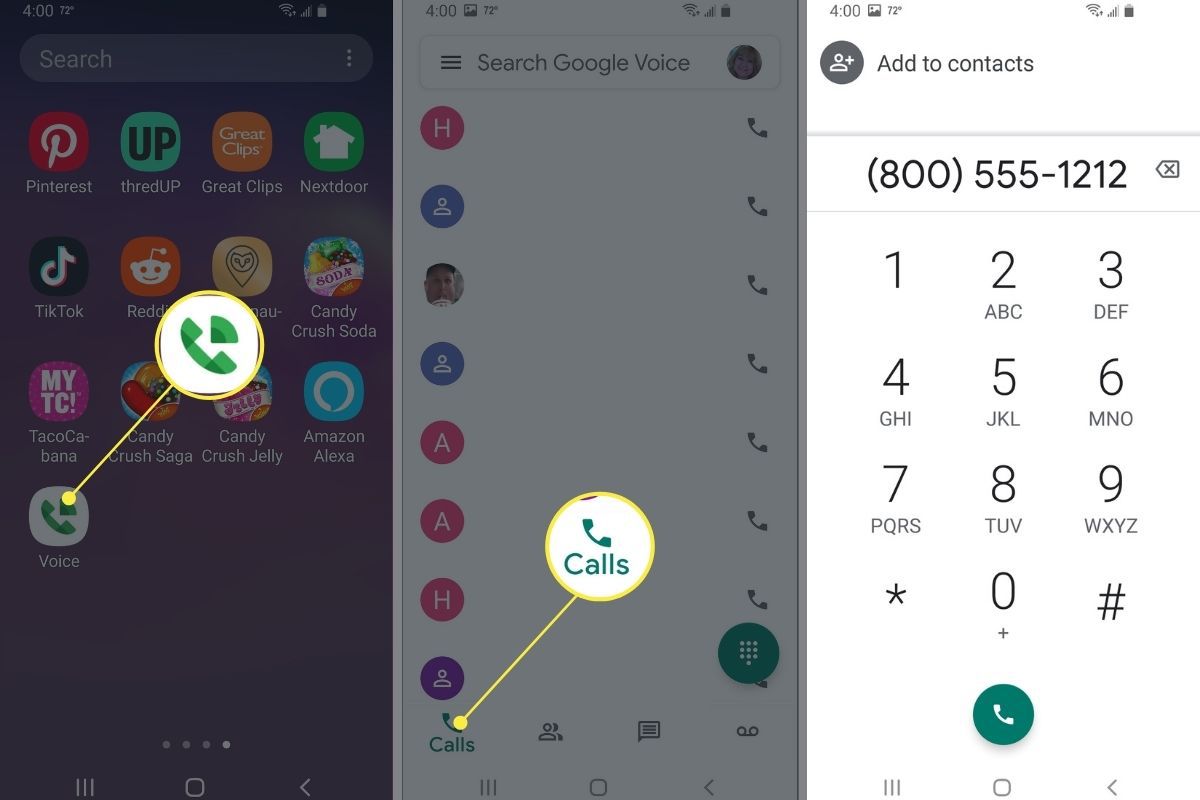
5. Access Recordings
You can easily check voice recordings for each call. All you need to do is open the last call details and press ‘Voicemail’. This will expand the list of recordings. Now tap on the play button and listen to the audio.
6. Save Transcripts
When you record your calls with Google Voice, the recordings will save in the app storage. However, you can save and share those recordings in your mobile phone storage by selecting the ellipsis (•••) button. You will find the button on the recording page as some options will appear on the screen. You have to choose ‘Copy transcript’ and paste it in the message or notepad. Keep in mind that you can only save transcripts of recorded calls.
Closing Word
Now that you know simple and easy steps to record your calls with Google Voice, you can grab your device and get started. The Google voice recorder is a significantly helpful app with built-in features. You can also create a video out of the recordings using a simple video editor, Wondershare Filmora .
For Win 7 or later (64-bit)
For macOS 10.12 or later
Filmora editing video empowers your story and allows you to splice multiple audio and videos. Learn how to edit audio using Filmora and transform your call recordings into something creative. Here are some benefits of using Wondershare Filmora:
- Audio equalize
- Audio enhancement
- Advanced text editing
- Video and audio controls
- Audio separation
- Audio-mixer
- Speed control
- Add background music
Versatile Video Editor - Wondershare Filmora
An easy yet powerful editor
Numerous effects to choose from
Detailed tutorials provided by the official channel
How to Record Calls with Google Voice?
Google voice is a built-in recording tool for iOS and android devices. This tool enables you to capture and record calls so that you don’t miss any important conversations. For instance, if you are taking an on-call session with your professor, you can record your calls with Google Voice and save them for later reference.
Also, you can use Google voice recording as a default application for incoming calls. However, before that, you should enable the application from Settings. Follow these steps to record your calls with Google Voice:
- Open the application and visit the homepage
- From the upper left corner choose settings
- Click on the ‘Calls’ option from the menu
- Find enable the incoming call options
- Once activated you can record your calls with Google Voice by pressing number 4 on the keypad.
How to Record a Google Voice Call on Android
Here are some steps to Google voice record call on Android:
1. Install Google Voice
Google voice is better than various paid voice recording applications that you can download from Google Play. Initially, most call recording application work fine, but after a while, the apps stop working. In this case, you can download a new app or purchase the subscription.
Therefore, make sure you record your calls with Google Voice and save t money. One drawback of Google Voice is that you can record incoming calls only. Google voice recorder doesn’t support outgoing calls.

2. Create a Google Voice Number
Now open the app and press the ‘Get Started’ tab on the landing page. This will open the ‘Manage accounts page. On this page, you have to choose your Google account to link with your new Google Voice number. After you choose an account, the app leads you to the Terms and Conditions page, where you can read the policy and Accept to proceed.

Alt Text: welcome to Google voice
A new page will open where you should choose a Google Voice number. Tap on ‘Search’ and find your city to pick a number. Also, you can choose suggested cities to get started. A list of numbers will appear on the following page. You can select any number you want to link with your Google account. Now a confirmation page will appear. On this page select the options and click ‘Next’.

Once you choose a new number, you have to verify your account with the existing number. Enter your mobile number and click on ‘Send Code’ to receive a verification code. The app’s algorithm will generate a six-digit code and send it to your existing number. Use this code to verify your identity. If the code is correct, your new Google voice recording number will activate. Now click on ‘Finish’ and you can record your calls with Google Voice.
3. Set Up Incoming Call Recordings
Still, there is a step left to record your calls. You need to go to mobile settings and enable call recording. To enable call recordings, you need to click on the menu icon and navigate to the ‘settings’ from the sidebar menu. Now select the ‘Incoming calls options’ and turn on the recordings.
4. Record Incoming Calls
After completing the setup, you can record incoming calls on your phone using Google Voice. However, every time you receive a call, you must open the dial pad and press 4 to start recording. As soon as you start recording, the caller will receive a verbal alert that notifies that the call is on recording mode. You can stop recording by pressing 4 one more time. This will also inform the user that you stopped the recording.

5. Access Recordings
You can easily check voice recordings for each call. All you need to do is open the last call details and press ‘Voicemail’. This will expand the list of recordings. Now tap on the play button and listen to the audio.
6. Save Transcripts
When you record your calls with Google Voice, the recordings will save in the app storage. However, you can save and share those recordings in your mobile phone storage by selecting the ellipsis (•••) button. You will find the button on the recording page as some options will appear on the screen. You have to choose ‘Copy transcript’ and paste it in the message or notepad. Keep in mind that you can only save transcripts of recorded calls.
Closing Word
Now that you know simple and easy steps to record your calls with Google Voice, you can grab your device and get started. The Google voice recorder is a significantly helpful app with built-in features. You can also create a video out of the recordings using a simple video editor, Wondershare Filmora .
For Win 7 or later (64-bit)
For macOS 10.12 or later
Filmora editing video empowers your story and allows you to splice multiple audio and videos. Learn how to edit audio using Filmora and transform your call recordings into something creative. Here are some benefits of using Wondershare Filmora:
- Audio equalize
- Audio enhancement
- Advanced text editing
- Video and audio controls
- Audio separation
- Audio-mixer
- Speed control
- Add background music
Versatile Video Editor - Wondershare Filmora
An easy yet powerful editor
Numerous effects to choose from
Detailed tutorials provided by the official channel
How to Record Calls with Google Voice?
Google voice is a built-in recording tool for iOS and android devices. This tool enables you to capture and record calls so that you don’t miss any important conversations. For instance, if you are taking an on-call session with your professor, you can record your calls with Google Voice and save them for later reference.
Also, you can use Google voice recording as a default application for incoming calls. However, before that, you should enable the application from Settings. Follow these steps to record your calls with Google Voice:
- Open the application and visit the homepage
- From the upper left corner choose settings
- Click on the ‘Calls’ option from the menu
- Find enable the incoming call options
- Once activated you can record your calls with Google Voice by pressing number 4 on the keypad.
How to Record a Google Voice Call on Android
Here are some steps to Google voice record call on Android:
1. Install Google Voice
Google voice is better than various paid voice recording applications that you can download from Google Play. Initially, most call recording application work fine, but after a while, the apps stop working. In this case, you can download a new app or purchase the subscription.
Therefore, make sure you record your calls with Google Voice and save t money. One drawback of Google Voice is that you can record incoming calls only. Google voice recorder doesn’t support outgoing calls.

2. Create a Google Voice Number
Now open the app and press the ‘Get Started’ tab on the landing page. This will open the ‘Manage accounts page. On this page, you have to choose your Google account to link with your new Google Voice number. After you choose an account, the app leads you to the Terms and Conditions page, where you can read the policy and Accept to proceed.

Alt Text: welcome to Google voice
A new page will open where you should choose a Google Voice number. Tap on ‘Search’ and find your city to pick a number. Also, you can choose suggested cities to get started. A list of numbers will appear on the following page. You can select any number you want to link with your Google account. Now a confirmation page will appear. On this page select the options and click ‘Next’.

Once you choose a new number, you have to verify your account with the existing number. Enter your mobile number and click on ‘Send Code’ to receive a verification code. The app’s algorithm will generate a six-digit code and send it to your existing number. Use this code to verify your identity. If the code is correct, your new Google voice recording number will activate. Now click on ‘Finish’ and you can record your calls with Google Voice.
3. Set Up Incoming Call Recordings
Still, there is a step left to record your calls. You need to go to mobile settings and enable call recording. To enable call recordings, you need to click on the menu icon and navigate to the ‘settings’ from the sidebar menu. Now select the ‘Incoming calls options’ and turn on the recordings.
4. Record Incoming Calls
After completing the setup, you can record incoming calls on your phone using Google Voice. However, every time you receive a call, you must open the dial pad and press 4 to start recording. As soon as you start recording, the caller will receive a verbal alert that notifies that the call is on recording mode. You can stop recording by pressing 4 one more time. This will also inform the user that you stopped the recording.

5. Access Recordings
You can easily check voice recordings for each call. All you need to do is open the last call details and press ‘Voicemail’. This will expand the list of recordings. Now tap on the play button and listen to the audio.
6. Save Transcripts
When you record your calls with Google Voice, the recordings will save in the app storage. However, you can save and share those recordings in your mobile phone storage by selecting the ellipsis (•••) button. You will find the button on the recording page as some options will appear on the screen. You have to choose ‘Copy transcript’ and paste it in the message or notepad. Keep in mind that you can only save transcripts of recorded calls.
Closing Word
Now that you know simple and easy steps to record your calls with Google Voice, you can grab your device and get started. The Google voice recorder is a significantly helpful app with built-in features. You can also create a video out of the recordings using a simple video editor, Wondershare Filmora .
For Win 7 or later (64-bit)
For macOS 10.12 or later
Filmora editing video empowers your story and allows you to splice multiple audio and videos. Learn how to edit audio using Filmora and transform your call recordings into something creative. Here are some benefits of using Wondershare Filmora:
- Audio equalize
- Audio enhancement
- Advanced text editing
- Video and audio controls
- Audio separation
- Audio-mixer
- Speed control
- Add background music
Versatile Video Editor - Wondershare Filmora
An easy yet powerful editor
Numerous effects to choose from
Detailed tutorials provided by the official channel
How to Record Calls with Google Voice?
Google voice is a built-in recording tool for iOS and android devices. This tool enables you to capture and record calls so that you don’t miss any important conversations. For instance, if you are taking an on-call session with your professor, you can record your calls with Google Voice and save them for later reference.
Also, you can use Google voice recording as a default application for incoming calls. However, before that, you should enable the application from Settings. Follow these steps to record your calls with Google Voice:
- Open the application and visit the homepage
- From the upper left corner choose settings
- Click on the ‘Calls’ option from the menu
- Find enable the incoming call options
- Once activated you can record your calls with Google Voice by pressing number 4 on the keypad.
How to Record a Google Voice Call on Android
Here are some steps to Google voice record call on Android:
1. Install Google Voice
Google voice is better than various paid voice recording applications that you can download from Google Play. Initially, most call recording application work fine, but after a while, the apps stop working. In this case, you can download a new app or purchase the subscription.
Therefore, make sure you record your calls with Google Voice and save t money. One drawback of Google Voice is that you can record incoming calls only. Google voice recorder doesn’t support outgoing calls.

2. Create a Google Voice Number
Now open the app and press the ‘Get Started’ tab on the landing page. This will open the ‘Manage accounts page. On this page, you have to choose your Google account to link with your new Google Voice number. After you choose an account, the app leads you to the Terms and Conditions page, where you can read the policy and Accept to proceed.

Alt Text: welcome to Google voice
A new page will open where you should choose a Google Voice number. Tap on ‘Search’ and find your city to pick a number. Also, you can choose suggested cities to get started. A list of numbers will appear on the following page. You can select any number you want to link with your Google account. Now a confirmation page will appear. On this page select the options and click ‘Next’.

Once you choose a new number, you have to verify your account with the existing number. Enter your mobile number and click on ‘Send Code’ to receive a verification code. The app’s algorithm will generate a six-digit code and send it to your existing number. Use this code to verify your identity. If the code is correct, your new Google voice recording number will activate. Now click on ‘Finish’ and you can record your calls with Google Voice.
3. Set Up Incoming Call Recordings
Still, there is a step left to record your calls. You need to go to mobile settings and enable call recording. To enable call recordings, you need to click on the menu icon and navigate to the ‘settings’ from the sidebar menu. Now select the ‘Incoming calls options’ and turn on the recordings.
4. Record Incoming Calls
After completing the setup, you can record incoming calls on your phone using Google Voice. However, every time you receive a call, you must open the dial pad and press 4 to start recording. As soon as you start recording, the caller will receive a verbal alert that notifies that the call is on recording mode. You can stop recording by pressing 4 one more time. This will also inform the user that you stopped the recording.

5. Access Recordings
You can easily check voice recordings for each call. All you need to do is open the last call details and press ‘Voicemail’. This will expand the list of recordings. Now tap on the play button and listen to the audio.
6. Save Transcripts
When you record your calls with Google Voice, the recordings will save in the app storage. However, you can save and share those recordings in your mobile phone storage by selecting the ellipsis (•••) button. You will find the button on the recording page as some options will appear on the screen. You have to choose ‘Copy transcript’ and paste it in the message or notepad. Keep in mind that you can only save transcripts of recorded calls.
Closing Word
Now that you know simple and easy steps to record your calls with Google Voice, you can grab your device and get started. The Google voice recorder is a significantly helpful app with built-in features. You can also create a video out of the recordings using a simple video editor, Wondershare Filmora .
For Win 7 or later (64-bit)
For macOS 10.12 or later
Filmora editing video empowers your story and allows you to splice multiple audio and videos. Learn how to edit audio using Filmora and transform your call recordings into something creative. Here are some benefits of using Wondershare Filmora:
- Audio equalize
- Audio enhancement
- Advanced text editing
- Video and audio controls
- Audio separation
- Audio-mixer
- Speed control
- Add background music
Versatile Video Editor - Wondershare Filmora
An easy yet powerful editor
Numerous effects to choose from
Detailed tutorials provided by the official channel
Where Can I Find Scary Sound Effect?
Versatile Video Editor - Wondershare Filmora
An easy yet powerful editor
Numerous effects to choose from
Detailed tutorials provided by the official channel
Getting sound effects for your videos or audios can be difficult, but fret not! We are here to aid you in that task. There are several ways of doing so, and you are going to learn those here on our website as you take a trip through it. We will keep this concise and brief because we care about your time. This article will teach you where to get sound effects in mp3 form. They can be scary sound effects, dialogues, scream sound effects, or whatever sound effect you need. Still, we will also teach you how to make your sound effects and add that good effect into your video or audio file.
In this article
01 [Ways to Download All Kinds of Sound Effect](#Part 1)
02 [Use Filmora to Add Background Music to Your Video](#Part 2)
Part 1 Ways to Download All Kinds of Sound Effect
Let’s get the first and probably the most important part out of the way, where to get scary scream sound effects. There are quite a few ways of doing so. We are sure you will find the desired method.
1. Download from Some YouTube Video
This one may not seem very obvious to people. Still, it is a very plausible way of downloading sound effects, but make sure that the audio clips uploaded are the original producer and have given explicit permission to use it. If not, you might want to get their permission first. Otherwise, you could get in trouble, which none of us would like.
Step 1: Firstly, go to you tube’s search bar on the top, and type in the name of the scary sounds mp3 effect you want, then type sound effect after it, and then press enter.

Doing so will show you a list of ‘videos’ that have the desired scary movie sound effects, but in reality, it will most likely be an audio clip with a still image.
Step 2: Right-click on the video and press copy video URL.

Step 3: Afterward, click on your browser’s search bar and type <www.y2mate.com>, then press enter, but be sure to use ad-block and anti-virus on such sites. On the website, press on the big search bar in the middle of the page
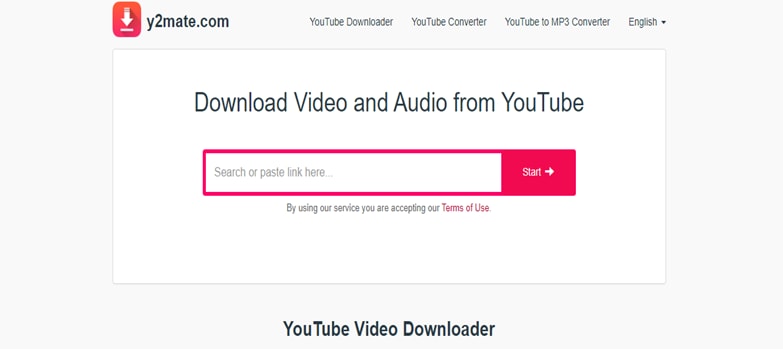
Step 4: Copy the video URL into it by pressing control and v together or right-clicking and pressing paste.
Step 5: Then press start. A list of options will be shown before you.
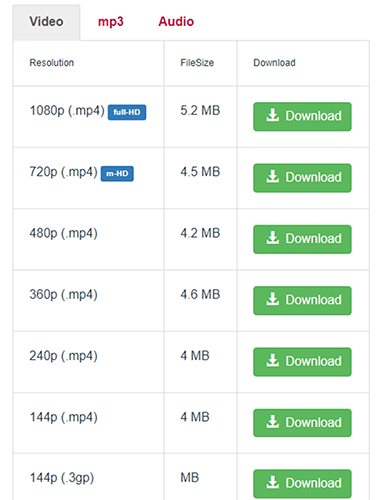
Step 6: Proceed to click on mp3 in the middle of the three options. There will be another list shown before you with only one choice this time.
Step 7: Then press start. A list of options will be shown before you.
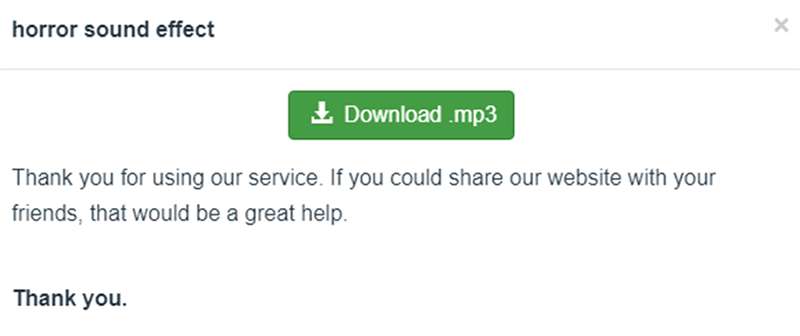
That will download the entirety of the video in audio format only. All of this is free. Later in this article, we will show you how to cut and trim it.
2. Make Scary Sound Effect by Yourself
If you are not satisfied with other scary sound effects or want something unique, you can make your sound effects. Initially, get a good-quality microphone with a pop filter for clear audio.
Be Sure To Be In a Quiet Room with Padding:
Connect the microphone to your computer make sure it is unmuted physically by pressing its button, as some microphones have a mute button on them.
Make Sure the Microphone Is Unmuted In the Software:
Step 1: Open a recording software, such as OBS Studio or audio recorder from Windows.
Step 2: Press record and make the sound effect you want.
Step 3: End the recording by pressing stop recording. You will now have recorded a scary music sound effect saved on your computer.
This method requires money for a good microphone, a pop filter, and padding.
3. Getting Sound Effects from Free Websites
This option is attractive to many people, from beginners to people testing out the waters of audio editing. However, it should be noticed that the sound quality is not the best.
You can get free sound effects from websites such as Freesound.com or Soundeffectsplus.com.
Step 1: First of all, go to the website.
Step 2: Register an account
Step 3: Then search your desired sound effect
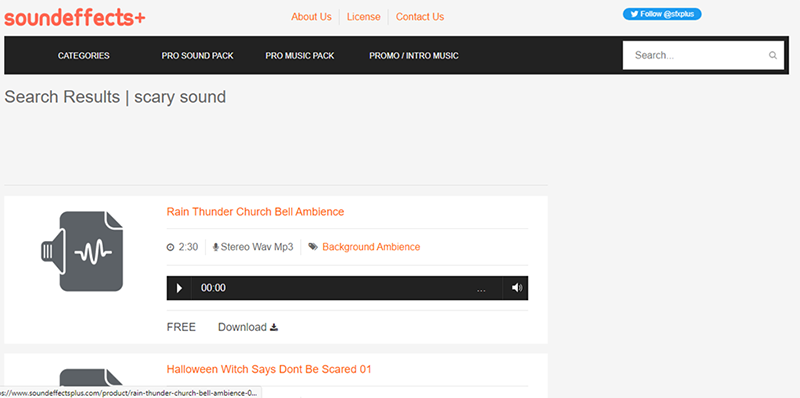
Step 4: Press download next to it.
Pretty straightforward, and as mentioned, these are free, but with limitations such as total download amount per month or licensing.
4. Buying Sound Effects
If you have money but not time to make your audio effects, you can buy sound effects off the internet. Usually, these sellers have excellent quality audio; they can even make specific sound effects tailored to your needs.
- Many websites sell sound effects, including the likes of – <www.prosoundeffects.com> and <www.soundsnap.com>.
- Both websites are famous among the audio effects community; soundscape even provides audio for Nickelodeon, Disney, Pixar, HBO, and Netflix.
- As per usual, you first register an account.
- Once you are done with that, you buy the package you want, whether a one-time payment, bi-annual, or annual plan.
- These plans have different terms, such as 150 downloads per 6 months. Make sure of the times you will buy before you confirm the purchase.
- Then your search for the audio you want in the search bar
- Afterward, you click download. That’s it! You got it.
Now, let’s talk about inserting them into your product; this requires an editor. And this is where Wondershare’s editing software Filmora comes in.
Part 2 Use Filmora to Add Background Music to Your Video
Filmora is Wondershare’s editing software which, at this point, everyone has heard of. Wondershare has made it an easy-to-use editor so that everyone can edit with it, from beginners to the most skilled professionals, as it has the features and tools to cater to all such users’ needs. It provides free audio effects and video effects to its buyers, and much more. Filmora allows you to cut and edit your sound effects and add any audio you want to your video. Yep, you can edit videos with it too! Filmora enables you to make quality products, whether audio or video.
For Win 7 or later (64-bit)
For macOS 10.12 or later
Filmora has some outstanding features, such as allowing you to change audio pitch and volume, obviously letting you edit videos, trimming them, and joining them together. Colour-grading, as well as subtitling.
Since Filmora has several packages, including monthly, yearly, and perpetual, you might want to give it is trial a shot before buying the real thing. This way you can confirm what package suits your requirements.
Features:
- It widely supports different formats.
- Powerful video editing features and intuitive user interface.
- Transfer to a popular device option, upload to YouTube, or burn to DVD.
- A choice of 300+ stunning effects for different niches.
- Royalty-free music, Modern and easy to use.
Step by Step Guide for How to Add Sound Effects to Video with Filmora:
Step 1: Go to the Filmora official website, install wonder share Filmora, and lunch it. Once it’s launched, you will find a tab just below the menu bar, tap media, and click import. After this, there will be a drop-down where you can click on import media files and choose the video file. You can also use build-in music tracks to add music to your video by selecting the Music tab. Repeat the process to pick the desired background music.
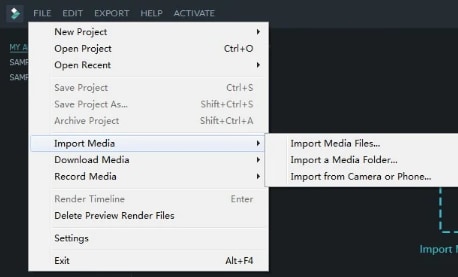
Step 2: Now, you can navigate the video you imported to Filmora, then tap on the sign ‘+’on it alternatively; you can drag down the media file to the timeline.
Step 3: Now, edit your music by double-tapping the audio from the timeline. It will display the audio panel at the top of the screen. You can use it to set the desired equalizer manage pitch volume and speed. You can also use the forum to fade in or fade out.
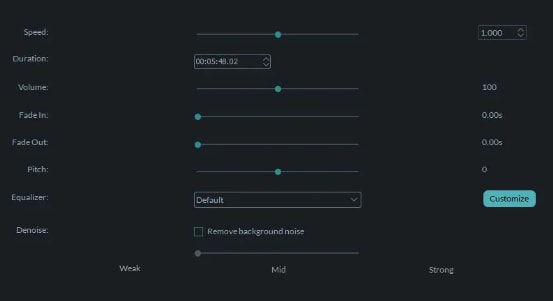
Step 4: Finally, you can now export the video that has made the desired changes by clicking ‘export’ on the toolbar to export the video. You can now save the exported in the desired format and remember to rename it directly.
Wondershare Filmora
Get started easily with Filmora’s powerful performance, intuitive interface, and countless effects!
Try It Free Try It Free Try It Free Learn More >

AI Portrait – The best feature of Wondershare Filmora for gameplay editing
The AI Portrait is a new add-on in Wondershare Filmora. It can easily remove video backgrounds without using a green screen or chroma key, allowing you to add borders, glitch effects, pixelated, noise, or segmentation video effects.
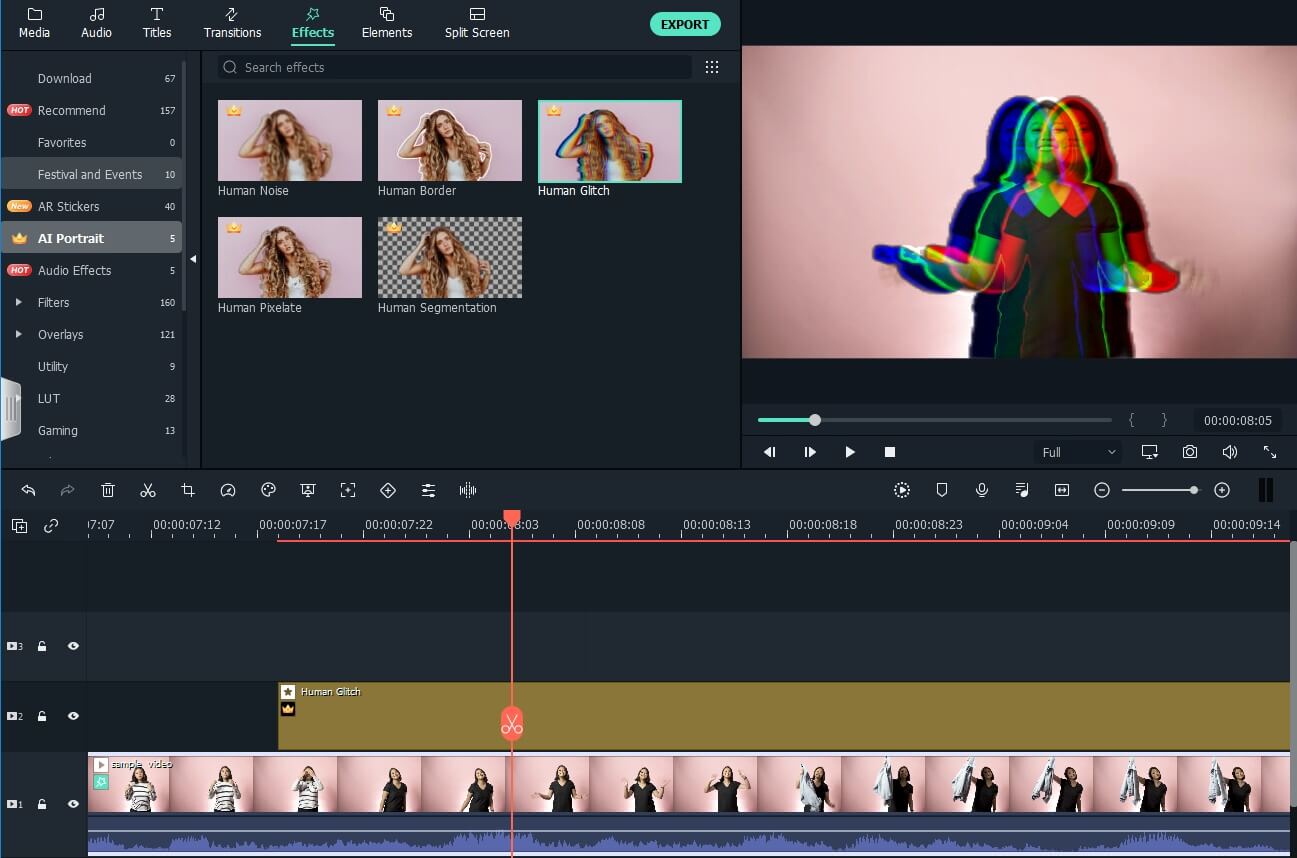
Conclusion
In the end, we can tell you that there are numerous ways of procuring sound effects, and we have listed a small but popular portion of them, whether they are scary sound effects or a different type does not matter as you can find them all with the help of our guide. That is not all, though, since you will need a good
Getting sound effects for your videos or audios can be difficult, but fret not! We are here to aid you in that task. There are several ways of doing so, and you are going to learn those here on our website as you take a trip through it. We will keep this concise and brief because we care about your time. This article will teach you where to get sound effects in mp3 form. They can be scary sound effects, dialogues, scream sound effects, or whatever sound effect you need. Still, we will also teach you how to make your sound effects and add that good effect into your video or audio file.
In this article
01 [Ways to Download All Kinds of Sound Effect](#Part 1)
02 [Use Filmora to Add Background Music to Your Video](#Part 2)
Part 1 Ways to Download All Kinds of Sound Effect
Let’s get the first and probably the most important part out of the way, where to get scary scream sound effects. There are quite a few ways of doing so. We are sure you will find the desired method.
1. Download from Some YouTube Video
This one may not seem very obvious to people. Still, it is a very plausible way of downloading sound effects, but make sure that the audio clips uploaded are the original producer and have given explicit permission to use it. If not, you might want to get their permission first. Otherwise, you could get in trouble, which none of us would like.
Step 1: Firstly, go to you tube’s search bar on the top, and type in the name of the scary sounds mp3 effect you want, then type sound effect after it, and then press enter.

Doing so will show you a list of ‘videos’ that have the desired scary movie sound effects, but in reality, it will most likely be an audio clip with a still image.
Step 2: Right-click on the video and press copy video URL.

Step 3: Afterward, click on your browser’s search bar and type <www.y2mate.com>, then press enter, but be sure to use ad-block and anti-virus on such sites. On the website, press on the big search bar in the middle of the page

Step 4: Copy the video URL into it by pressing control and v together or right-clicking and pressing paste.
Step 5: Then press start. A list of options will be shown before you.

Step 6: Proceed to click on mp3 in the middle of the three options. There will be another list shown before you with only one choice this time.
Step 7: Then press start. A list of options will be shown before you.

That will download the entirety of the video in audio format only. All of this is free. Later in this article, we will show you how to cut and trim it.
2. Make Scary Sound Effect by Yourself
If you are not satisfied with other scary sound effects or want something unique, you can make your sound effects. Initially, get a good-quality microphone with a pop filter for clear audio.
Be Sure To Be In a Quiet Room with Padding:
Connect the microphone to your computer make sure it is unmuted physically by pressing its button, as some microphones have a mute button on them.
Make Sure the Microphone Is Unmuted In the Software:
Step 1: Open a recording software, such as OBS Studio or audio recorder from Windows.
Step 2: Press record and make the sound effect you want.
Step 3: End the recording by pressing stop recording. You will now have recorded a scary music sound effect saved on your computer.
This method requires money for a good microphone, a pop filter, and padding.
3. Getting Sound Effects from Free Websites
This option is attractive to many people, from beginners to people testing out the waters of audio editing. However, it should be noticed that the sound quality is not the best.
You can get free sound effects from websites such as Freesound.com or Soundeffectsplus.com.
Step 1: First of all, go to the website.
Step 2: Register an account
Step 3: Then search your desired sound effect

Step 4: Press download next to it.
Pretty straightforward, and as mentioned, these are free, but with limitations such as total download amount per month or licensing.
4. Buying Sound Effects
If you have money but not time to make your audio effects, you can buy sound effects off the internet. Usually, these sellers have excellent quality audio; they can even make specific sound effects tailored to your needs.
- Many websites sell sound effects, including the likes of – <www.prosoundeffects.com> and <www.soundsnap.com>.
- Both websites are famous among the audio effects community; soundscape even provides audio for Nickelodeon, Disney, Pixar, HBO, and Netflix.
- As per usual, you first register an account.
- Once you are done with that, you buy the package you want, whether a one-time payment, bi-annual, or annual plan.
- These plans have different terms, such as 150 downloads per 6 months. Make sure of the times you will buy before you confirm the purchase.
- Then your search for the audio you want in the search bar
- Afterward, you click download. That’s it! You got it.
Now, let’s talk about inserting them into your product; this requires an editor. And this is where Wondershare’s editing software Filmora comes in.
Part 2 Use Filmora to Add Background Music to Your Video
Filmora is Wondershare’s editing software which, at this point, everyone has heard of. Wondershare has made it an easy-to-use editor so that everyone can edit with it, from beginners to the most skilled professionals, as it has the features and tools to cater to all such users’ needs. It provides free audio effects and video effects to its buyers, and much more. Filmora allows you to cut and edit your sound effects and add any audio you want to your video. Yep, you can edit videos with it too! Filmora enables you to make quality products, whether audio or video.
For Win 7 or later (64-bit)
For macOS 10.12 or later
Filmora has some outstanding features, such as allowing you to change audio pitch and volume, obviously letting you edit videos, trimming them, and joining them together. Colour-grading, as well as subtitling.
Since Filmora has several packages, including monthly, yearly, and perpetual, you might want to give it is trial a shot before buying the real thing. This way you can confirm what package suits your requirements.
Features:
- It widely supports different formats.
- Powerful video editing features and intuitive user interface.
- Transfer to a popular device option, upload to YouTube, or burn to DVD.
- A choice of 300+ stunning effects for different niches.
- Royalty-free music, Modern and easy to use.
Step by Step Guide for How to Add Sound Effects to Video with Filmora:
Step 1: Go to the Filmora official website, install wonder share Filmora, and lunch it. Once it’s launched, you will find a tab just below the menu bar, tap media, and click import. After this, there will be a drop-down where you can click on import media files and choose the video file. You can also use build-in music tracks to add music to your video by selecting the Music tab. Repeat the process to pick the desired background music.

Step 2: Now, you can navigate the video you imported to Filmora, then tap on the sign ‘+’on it alternatively; you can drag down the media file to the timeline.
Step 3: Now, edit your music by double-tapping the audio from the timeline. It will display the audio panel at the top of the screen. You can use it to set the desired equalizer manage pitch volume and speed. You can also use the forum to fade in or fade out.

Step 4: Finally, you can now export the video that has made the desired changes by clicking ‘export’ on the toolbar to export the video. You can now save the exported in the desired format and remember to rename it directly.
Wondershare Filmora
Get started easily with Filmora’s powerful performance, intuitive interface, and countless effects!
Try It Free Try It Free Try It Free Learn More >

AI Portrait – The best feature of Wondershare Filmora for gameplay editing
The AI Portrait is a new add-on in Wondershare Filmora. It can easily remove video backgrounds without using a green screen or chroma key, allowing you to add borders, glitch effects, pixelated, noise, or segmentation video effects.

Conclusion
In the end, we can tell you that there are numerous ways of procuring sound effects, and we have listed a small but popular portion of them, whether they are scary sound effects or a different type does not matter as you can find them all with the help of our guide. That is not all, though, since you will need a good
Getting sound effects for your videos or audios can be difficult, but fret not! We are here to aid you in that task. There are several ways of doing so, and you are going to learn those here on our website as you take a trip through it. We will keep this concise and brief because we care about your time. This article will teach you where to get sound effects in mp3 form. They can be scary sound effects, dialogues, scream sound effects, or whatever sound effect you need. Still, we will also teach you how to make your sound effects and add that good effect into your video or audio file.
In this article
01 [Ways to Download All Kinds of Sound Effect](#Part 1)
02 [Use Filmora to Add Background Music to Your Video](#Part 2)
Part 1 Ways to Download All Kinds of Sound Effect
Let’s get the first and probably the most important part out of the way, where to get scary scream sound effects. There are quite a few ways of doing so. We are sure you will find the desired method.
1. Download from Some YouTube Video
This one may not seem very obvious to people. Still, it is a very plausible way of downloading sound effects, but make sure that the audio clips uploaded are the original producer and have given explicit permission to use it. If not, you might want to get their permission first. Otherwise, you could get in trouble, which none of us would like.
Step 1: Firstly, go to you tube’s search bar on the top, and type in the name of the scary sounds mp3 effect you want, then type sound effect after it, and then press enter.

Doing so will show you a list of ‘videos’ that have the desired scary movie sound effects, but in reality, it will most likely be an audio clip with a still image.
Step 2: Right-click on the video and press copy video URL.

Step 3: Afterward, click on your browser’s search bar and type <www.y2mate.com>, then press enter, but be sure to use ad-block and anti-virus on such sites. On the website, press on the big search bar in the middle of the page

Step 4: Copy the video URL into it by pressing control and v together or right-clicking and pressing paste.
Step 5: Then press start. A list of options will be shown before you.

Step 6: Proceed to click on mp3 in the middle of the three options. There will be another list shown before you with only one choice this time.
Step 7: Then press start. A list of options will be shown before you.

That will download the entirety of the video in audio format only. All of this is free. Later in this article, we will show you how to cut and trim it.
2. Make Scary Sound Effect by Yourself
If you are not satisfied with other scary sound effects or want something unique, you can make your sound effects. Initially, get a good-quality microphone with a pop filter for clear audio.
Be Sure To Be In a Quiet Room with Padding:
Connect the microphone to your computer make sure it is unmuted physically by pressing its button, as some microphones have a mute button on them.
Make Sure the Microphone Is Unmuted In the Software:
Step 1: Open a recording software, such as OBS Studio or audio recorder from Windows.
Step 2: Press record and make the sound effect you want.
Step 3: End the recording by pressing stop recording. You will now have recorded a scary music sound effect saved on your computer.
This method requires money for a good microphone, a pop filter, and padding.
3. Getting Sound Effects from Free Websites
This option is attractive to many people, from beginners to people testing out the waters of audio editing. However, it should be noticed that the sound quality is not the best.
You can get free sound effects from websites such as Freesound.com or Soundeffectsplus.com.
Step 1: First of all, go to the website.
Step 2: Register an account
Step 3: Then search your desired sound effect

Step 4: Press download next to it.
Pretty straightforward, and as mentioned, these are free, but with limitations such as total download amount per month or licensing.
4. Buying Sound Effects
If you have money but not time to make your audio effects, you can buy sound effects off the internet. Usually, these sellers have excellent quality audio; they can even make specific sound effects tailored to your needs.
- Many websites sell sound effects, including the likes of – <www.prosoundeffects.com> and <www.soundsnap.com>.
- Both websites are famous among the audio effects community; soundscape even provides audio for Nickelodeon, Disney, Pixar, HBO, and Netflix.
- As per usual, you first register an account.
- Once you are done with that, you buy the package you want, whether a one-time payment, bi-annual, or annual plan.
- These plans have different terms, such as 150 downloads per 6 months. Make sure of the times you will buy before you confirm the purchase.
- Then your search for the audio you want in the search bar
- Afterward, you click download. That’s it! You got it.
Now, let’s talk about inserting them into your product; this requires an editor. And this is where Wondershare’s editing software Filmora comes in.
Part 2 Use Filmora to Add Background Music to Your Video
Filmora is Wondershare’s editing software which, at this point, everyone has heard of. Wondershare has made it an easy-to-use editor so that everyone can edit with it, from beginners to the most skilled professionals, as it has the features and tools to cater to all such users’ needs. It provides free audio effects and video effects to its buyers, and much more. Filmora allows you to cut and edit your sound effects and add any audio you want to your video. Yep, you can edit videos with it too! Filmora enables you to make quality products, whether audio or video.
For Win 7 or later (64-bit)
For macOS 10.12 or later
Filmora has some outstanding features, such as allowing you to change audio pitch and volume, obviously letting you edit videos, trimming them, and joining them together. Colour-grading, as well as subtitling.
Since Filmora has several packages, including monthly, yearly, and perpetual, you might want to give it is trial a shot before buying the real thing. This way you can confirm what package suits your requirements.
Features:
- It widely supports different formats.
- Powerful video editing features and intuitive user interface.
- Transfer to a popular device option, upload to YouTube, or burn to DVD.
- A choice of 300+ stunning effects for different niches.
- Royalty-free music, Modern and easy to use.
Step by Step Guide for How to Add Sound Effects to Video with Filmora:
Step 1: Go to the Filmora official website, install wonder share Filmora, and lunch it. Once it’s launched, you will find a tab just below the menu bar, tap media, and click import. After this, there will be a drop-down where you can click on import media files and choose the video file. You can also use build-in music tracks to add music to your video by selecting the Music tab. Repeat the process to pick the desired background music.

Step 2: Now, you can navigate the video you imported to Filmora, then tap on the sign ‘+’on it alternatively; you can drag down the media file to the timeline.
Step 3: Now, edit your music by double-tapping the audio from the timeline. It will display the audio panel at the top of the screen. You can use it to set the desired equalizer manage pitch volume and speed. You can also use the forum to fade in or fade out.

Step 4: Finally, you can now export the video that has made the desired changes by clicking ‘export’ on the toolbar to export the video. You can now save the exported in the desired format and remember to rename it directly.
Wondershare Filmora
Get started easily with Filmora’s powerful performance, intuitive interface, and countless effects!
Try It Free Try It Free Try It Free Learn More >

AI Portrait – The best feature of Wondershare Filmora for gameplay editing
The AI Portrait is a new add-on in Wondershare Filmora. It can easily remove video backgrounds without using a green screen or chroma key, allowing you to add borders, glitch effects, pixelated, noise, or segmentation video effects.

Conclusion
In the end, we can tell you that there are numerous ways of procuring sound effects, and we have listed a small but popular portion of them, whether they are scary sound effects or a different type does not matter as you can find them all with the help of our guide. That is not all, though, since you will need a good
Getting sound effects for your videos or audios can be difficult, but fret not! We are here to aid you in that task. There are several ways of doing so, and you are going to learn those here on our website as you take a trip through it. We will keep this concise and brief because we care about your time. This article will teach you where to get sound effects in mp3 form. They can be scary sound effects, dialogues, scream sound effects, or whatever sound effect you need. Still, we will also teach you how to make your sound effects and add that good effect into your video or audio file.
In this article
01 [Ways to Download All Kinds of Sound Effect](#Part 1)
02 [Use Filmora to Add Background Music to Your Video](#Part 2)
Part 1 Ways to Download All Kinds of Sound Effect
Let’s get the first and probably the most important part out of the way, where to get scary scream sound effects. There are quite a few ways of doing so. We are sure you will find the desired method.
1. Download from Some YouTube Video
This one may not seem very obvious to people. Still, it is a very plausible way of downloading sound effects, but make sure that the audio clips uploaded are the original producer and have given explicit permission to use it. If not, you might want to get their permission first. Otherwise, you could get in trouble, which none of us would like.
Step 1: Firstly, go to you tube’s search bar on the top, and type in the name of the scary sounds mp3 effect you want, then type sound effect after it, and then press enter.

Doing so will show you a list of ‘videos’ that have the desired scary movie sound effects, but in reality, it will most likely be an audio clip with a still image.
Step 2: Right-click on the video and press copy video URL.

Step 3: Afterward, click on your browser’s search bar and type <www.y2mate.com>, then press enter, but be sure to use ad-block and anti-virus on such sites. On the website, press on the big search bar in the middle of the page

Step 4: Copy the video URL into it by pressing control and v together or right-clicking and pressing paste.
Step 5: Then press start. A list of options will be shown before you.

Step 6: Proceed to click on mp3 in the middle of the three options. There will be another list shown before you with only one choice this time.
Step 7: Then press start. A list of options will be shown before you.

That will download the entirety of the video in audio format only. All of this is free. Later in this article, we will show you how to cut and trim it.
2. Make Scary Sound Effect by Yourself
If you are not satisfied with other scary sound effects or want something unique, you can make your sound effects. Initially, get a good-quality microphone with a pop filter for clear audio.
Be Sure To Be In a Quiet Room with Padding:
Connect the microphone to your computer make sure it is unmuted physically by pressing its button, as some microphones have a mute button on them.
Make Sure the Microphone Is Unmuted In the Software:
Step 1: Open a recording software, such as OBS Studio or audio recorder from Windows.
Step 2: Press record and make the sound effect you want.
Step 3: End the recording by pressing stop recording. You will now have recorded a scary music sound effect saved on your computer.
This method requires money for a good microphone, a pop filter, and padding.
3. Getting Sound Effects from Free Websites
This option is attractive to many people, from beginners to people testing out the waters of audio editing. However, it should be noticed that the sound quality is not the best.
You can get free sound effects from websites such as Freesound.com or Soundeffectsplus.com.
Step 1: First of all, go to the website.
Step 2: Register an account
Step 3: Then search your desired sound effect

Step 4: Press download next to it.
Pretty straightforward, and as mentioned, these are free, but with limitations such as total download amount per month or licensing.
4. Buying Sound Effects
If you have money but not time to make your audio effects, you can buy sound effects off the internet. Usually, these sellers have excellent quality audio; they can even make specific sound effects tailored to your needs.
- Many websites sell sound effects, including the likes of – <www.prosoundeffects.com> and <www.soundsnap.com>.
- Both websites are famous among the audio effects community; soundscape even provides audio for Nickelodeon, Disney, Pixar, HBO, and Netflix.
- As per usual, you first register an account.
- Once you are done with that, you buy the package you want, whether a one-time payment, bi-annual, or annual plan.
- These plans have different terms, such as 150 downloads per 6 months. Make sure of the times you will buy before you confirm the purchase.
- Then your search for the audio you want in the search bar
- Afterward, you click download. That’s it! You got it.
Now, let’s talk about inserting them into your product; this requires an editor. And this is where Wondershare’s editing software Filmora comes in.
Part 2 Use Filmora to Add Background Music to Your Video
Filmora is Wondershare’s editing software which, at this point, everyone has heard of. Wondershare has made it an easy-to-use editor so that everyone can edit with it, from beginners to the most skilled professionals, as it has the features and tools to cater to all such users’ needs. It provides free audio effects and video effects to its buyers, and much more. Filmora allows you to cut and edit your sound effects and add any audio you want to your video. Yep, you can edit videos with it too! Filmora enables you to make quality products, whether audio or video.
For Win 7 or later (64-bit)
For macOS 10.12 or later
Filmora has some outstanding features, such as allowing you to change audio pitch and volume, obviously letting you edit videos, trimming them, and joining them together. Colour-grading, as well as subtitling.
Since Filmora has several packages, including monthly, yearly, and perpetual, you might want to give it is trial a shot before buying the real thing. This way you can confirm what package suits your requirements.
Features:
- It widely supports different formats.
- Powerful video editing features and intuitive user interface.
- Transfer to a popular device option, upload to YouTube, or burn to DVD.
- A choice of 300+ stunning effects for different niches.
- Royalty-free music, Modern and easy to use.
Step by Step Guide for How to Add Sound Effects to Video with Filmora:
Step 1: Go to the Filmora official website, install wonder share Filmora, and lunch it. Once it’s launched, you will find a tab just below the menu bar, tap media, and click import. After this, there will be a drop-down where you can click on import media files and choose the video file. You can also use build-in music tracks to add music to your video by selecting the Music tab. Repeat the process to pick the desired background music.

Step 2: Now, you can navigate the video you imported to Filmora, then tap on the sign ‘+’on it alternatively; you can drag down the media file to the timeline.
Step 3: Now, edit your music by double-tapping the audio from the timeline. It will display the audio panel at the top of the screen. You can use it to set the desired equalizer manage pitch volume and speed. You can also use the forum to fade in or fade out.

Step 4: Finally, you can now export the video that has made the desired changes by clicking ‘export’ on the toolbar to export the video. You can now save the exported in the desired format and remember to rename it directly.
Wondershare Filmora
Get started easily with Filmora’s powerful performance, intuitive interface, and countless effects!
Try It Free Try It Free Try It Free Learn More >

AI Portrait – The best feature of Wondershare Filmora for gameplay editing
The AI Portrait is a new add-on in Wondershare Filmora. It can easily remove video backgrounds without using a green screen or chroma key, allowing you to add borders, glitch effects, pixelated, noise, or segmentation video effects.

Conclusion
In the end, we can tell you that there are numerous ways of procuring sound effects, and we have listed a small but popular portion of them, whether they are scary sound effects or a different type does not matter as you can find them all with the help of our guide. That is not all, though, since you will need a good
Also read:
- New 2024 Approved Top 6 Introduction-Level Digital Audio Workstation Applications
- New 2023S Ultimate List of Gratis Audio Conversion Programs for Everyday Use for 2024
- The Art of Pitch Correction Implementing Autotune Effects Seamlessly in Audacity for 2024
- New 2024 Approved Expert Advice Proven Strategies for Capturing and Storing Sound with Your Mac
- The Essential Compilation Top Ten Downloadable Score Tracks for 2024
- New In 2024, When Can I Implement Side-Chain Compression for Enhanced Clarity?
- New Unveiling Androids 7 Best-Rated Voice Transformation Software
- New Fundamental Steps to Create a Premier Auditory Library on YouTube for 2024
- The Art of Concealing the Boundaries Between Sounds with Fades for 2024
- In 2024, Cut, Compress & Conquer Mastering Avidemux for Audio Post Production ( Edition)
- Guide to Muting Audio in iPhone Recordings Simplified Techniques for 2024
- Audio Fusion Seamlessly Converting AIFF Files Into MP3 Format for 2024
- Updated Perfect Your Windows 10 Media by Removing Loud Sounds, No Add-Ons Required for 2024
- New Unveiling Popular Melancholic Tunes for 2024
- Updated In 2024, Embarking on Editing Adventures with LexiEdit for Beginners
- Updated In 2024, Audiophiles Blueprint Top Tools and Practices to Minimize External Sound Interference (On & Off)
- New In 2024, Essential Websites to Foster New Relationships Online Safely
- Guide to Muting Audio in iPhone Recordings Simplified Techniques
- New 2024 Approved Exquisite Compilation of Hits Best-Selling Pop Songs to Accompany Videos
- In 2024, Essential Links for Obtaining High-Quality Ding Sound Samples
- New In 2024, Panoramic Listing of Podcast Index Networks and Services
- New 2024 Approved Commanding Attention Techniques for Higher Pitched Voice in Digital Storytelling
- In 2024, Karaoke Mode Made Simple No Cost MP3 Resizing to Perfect Your Performances.
- Updated 2024 Approved Free Video Editors Like Windows Movie Maker Top 10 Picks
- In 2024, Disabled iPhone 13 Pro How to Unlock a Disabled iPhone 13 Pro?
- In 2024, How to Detect and Stop mSpy from Spying on Your Samsung Galaxy M14 4G | Dr.fone
- New Windows 10 Webcam Recording Essentials Top 10 Software Picks for 2024
- Easy Guide How To Bypass Oppo F23 5G FRP Android 10/11/12/13
- Updated 2024 Approved Top 10 Free Online Video Compression Tools No Software Required
- 2024 Approved Best Ever Ways Make Tiktok Slideshow Solved
- Proven Ways in How To Hide Location on Life360 For Samsung Galaxy S23 FE | Dr.fone
- Updated The Best of Both Worlds Online and Offline Glitch Video Editors Compared for 2024
- How To Bypass iCloud By Checkra1n Even From iPhone 14 Pro Max If Youve Tried Everything
- In 2024, How To Pause Life360 Location Sharing For Vivo Y77t | Dr.fone
- Hard Resetting an Vivo G2 Device Made Easy | Dr.fone
- Hassle-Free Ways to Remove FRP Lock on OnePlus Nord CE 3 Lite 5G Phones with/without a PC
- 8 Best Apps for Screen Mirroring Oppo A1 5G PC | Dr.fone
- Updated In 2024, The Most Popular Online Video Editors for Chromebook Users
- In 2024, 5 Ways to Transfer Music from Vivo Y27s to Other Android Devices Easily | Dr.fone
- In 2024, Find My App Troubleshooting No Location Found vs. Location Not Available & How to Fix Them On Apple iPhone 15 Pro Max | Dr.fone
- New In 2024, The Ultimate Guide to Finding the Best Subtitle Edit Alternative for Mac
- Title: Updated 2024 Approved Precision Audio Cleanup Advanced Methods to Eradicate Echo and Hum
- Author: Jacob
- Created at : 2024-05-05 04:02:51
- Updated at : 2024-05-06 04:02:51
- Link: https://audio-shaping.techidaily.com/updated-2024-approved-precision-audio-cleanup-advanced-methods-to-eradicate-echo-and-hum/
- License: This work is licensed under CC BY-NC-SA 4.0.


